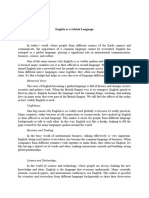0% found this document useful (0 votes)
19 views4 pagesInternational Language
The document discusses the implications of English as a global language, highlighting its advantages in facilitating communication and access to opportunities, while also addressing the disadvantages such as the decline of local languages and cultural homogenization. It presents various opinion questions, problems and solutions, and the effects of English on culture, emphasizing the need for bilingual education and preservation of linguistic diversity. Additionally, it explores the debate on whether learning English should be essential for success in today's world.
Uploaded by
Ekin SararslanCopyright
© © All Rights Reserved
We take content rights seriously. If you suspect this is your content, claim it here.
Available Formats
Download as PDF, TXT or read online on Scribd
0% found this document useful (0 votes)
19 views4 pagesInternational Language
The document discusses the implications of English as a global language, highlighting its advantages in facilitating communication and access to opportunities, while also addressing the disadvantages such as the decline of local languages and cultural homogenization. It presents various opinion questions, problems and solutions, and the effects of English on culture, emphasizing the need for bilingual education and preservation of linguistic diversity. Additionally, it explores the debate on whether learning English should be essential for success in today's world.
Uploaded by
Ekin SararslanCopyright
© © All Rights Reserved
We take content rights seriously. If you suspect this is your content, claim it here.
Available Formats
Download as PDF, TXT or read online on Scribd
/ 4



















































































